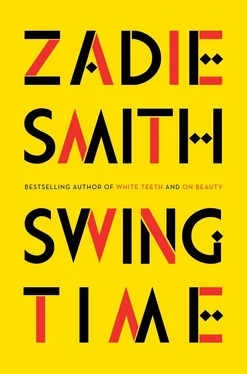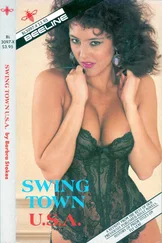But the signs were bad. Now when Tracey was asked to take her coat off in class she no longer refused, instead performing the action with terrible relish, unzipping slowly and in such a way that her breasts were presented to the rest of us with as much impact as possible, barely contained by an unsuitable top that showed off her abundance where the rest of us still had only nipples and bone. Everybody “knew” it cost 50p to “touch Tracey’s tits.” I had no idea whether this was true or not, but all the girls united in shunning her, black, white and brown. We were nice girls. We did not let people touch our non-existent tits, we were no longer the crazed things we’d been back in Year Three. Now we had “boyfriends,” chosen for us by other girls, in notes passed from desk to desk, or in long, tortuous phone calls (“Want to know who fancies you and told everyone he fancies you?”), and once these boyfriends had been formally assigned we stood solemnly with them in the playground in the thin winter sun, hand in hand — more often than not a head taller than them — until the inevitable moment came for us to break up (the timing of this, too, was decided by our friends) and the round of notes and calls would begin again. You could not take part in this process without belonging to a clique of willing females and Tracey had no girlfriends left, only me, and only then when she chose to be friendly. She took to spending her break-times in the boys’ football cage, sometimes cursing them, even picking up the ball and stopping play, but more often than not acting as their accomplice, laughing with them as they teased us, never attached to any boy in particular and yet, in the school’s imagination, freely handled by all. If she saw me through the bars, playing with Lily or doing Double Dutch with the other black and brown girls, she would make a show of turning and talking with her male circle, whispering with them, laughing, as if she, too, had an opinion on whether or not we wore bras or had started our periods. Once when I was walking past the football cage in a very dignified way, hand in hand with my new “boyfriend”—Paul Barron, the policeman’s son — she stopped what she was doing, gripped the bars of the cage and smiled out at me. Not a nice smile, a deeply sarcastic smile, as if to say: Oh, is that who you’re pretending to be now?
Three
By the time we’d escaped the kankurang, and passed through all intervening checkpoints, and after our taxi had made it through the clogged, pot-holed streets of the market town and on to the ferry port, by then it was too late, we were out of time, we ran down the gangway but found ourselves stranded with at least a hundred others, watching the rusty, hulking prow push forward into the water. The river split this finger of land in half throughout its length, and the airport was on the other side. I looked up at the ferry’s chaotic three-story cargo: mothers and their babies, schoolchildren, farmers and workers, animals, cars, trucks, bags of grain, tourist tat, oil drums, suitcases, furniture. The children waved at us. Nobody seemed sure if it was the last ferry. We waited. Time passed, the sky turned pink. I thought of Aimee, at the airport, having to make small talk with the Minister of Education — and of Judy in a rage, hunched over her phone, calling me over and over and getting nowhere — but these thoughts did not have their expected effect. I felt quite calm as I waited, resigned, alongside all these other people who seemed likewise to betray no impatience, or at least did not express impatience in any form I recognized. I had no network, there was nothing I could do. I was completely unreachable, for the first time in years. It gave me an unexpected but not unpleasant sense of stillness, of being outside of time: it reminded me somehow of childhood. I waited, leaning on the bonnet of the taxi. Others sat on their own luggage, or hitched themselves up on to the lids of oil drums. An old man rested on half of a giant bedstead. Two little girls straddled a cage of chickens. Periodically, articulated lorries inched their way along the gangway, shunting black diesel smoke down all our throats, honking to alert whoever might be sitting or sleeping in their path, but finding nowhere to go and nothing to do soon joined us in this wait that seemed to have no beginning and no end: we had always been looking out across the water for the ferry and always would be. At sunset our driver threw in the towel. Turned his taxi round, inched back through the crowd, and was away. To avoid a woman determined to sell me a watch I moved, too, toward the edge of the water, and sat down. But Lamin was concerned for me, he was always concerned for me, a person like me should be in the waiting room, which cost two of the filthy, crumpled notes I had balled up in my pocket, and for that reason naturally he would not go with me, but still he was insistent that I must go there, yes, the waiting room was certainly the place for a person like me.
“But why can’t we just wait where we are?”
He gave me his agonized smile, the only kind he had.
“For me it’s OK… but for you?”
It was still forty degrees outside: the idea of being in a room was nauseating. Instead I made him sit with me, our feet dangling over the water, kicking our heels against the heaps of dead oysters cemented to the struts of the pier. All the other young men in the village had dance music on their phones, precisely to listen to at times like these, but Lamin, a serious young man, preferred the World Service, and so taking one earbud each we listened to a story about the cost of university tuition in Ghana. Below us, at the shoreline, topless, broad-backed boys carried determined travelers on their shoulders, through the choppy shallows, to some brightly painted, perilous-looking narrowboats. I pointed to a very fat woman with a baby strapped to her back being hoisted on to the shoulders of one of them. Her thighs crushed his sweating head.
“Why can’t we do that? We’d be across in twenty minutes!”
“For me it’s OK,” Lamin whispered — it was as if every conversation we had were somehow shameful to him and must not be overheard—“not for you. You should go to the waiting room. It will be a long time.”
I watched the beach boy, soaking wet now up to his thighs, lower his passenger on to her seat. He looked less pained, shifting this cargo, than Lamin looked simply talking to me.
• • •
As it began to get dark, Lamin entered the crowd to ask questions, becoming another Lamin altogether, not the monosyllabic whisperer he was with me but what must have been the real Lamin, serious and respected by everyone, funny and loquacious, seeming to know everybody, greeted with warm, fraternal affection by beautiful young people wherever we went. His “age mates,” he called them, and this could mean either that he had grown up in the village with them, or that they had been in the same class in school, or else in his year at the teachers’ college. It was a tiny country: age mates were everywhere. The girl who sold us cashews in the market was his age mate, also a security guard in the airport. Sometimes age mates turned out to be one of the young police or army cadets who stopped us at the checkpoints, and that always felt like a piece of luck, the tension dissipated, they took their hands off their guns, leaned in through the passenger window and happily indulged in nostalgia. Age mates gave you a better price, issued tickets more quickly, waved you through. And now here was another one, a bosomy girl in the ferry office, wearing a confounding combination of items I had seen on many local girls and looked forward to showing Aimee, with the superior knowledge of the traveler who has arrived a whole week earlier. Skin-tight, low-riding, studded jeans, the skimpiest of vests — revealing the neon edges of a lacy bra — and a scarlet-red hijab, wrapped modestly round the face and secured with a glittering pink pin. I watched Lamin and this girl talk for a long time, in one of the several local languages Lamin spoke, and I tried to imagine how the simple answers we were seeking to the questions “Is there another ferry? When will it come?” could possibly be turned into as involved a debate as the two of them seemed to be having. Across the bay I heard a honking sound and saw a great shadowy shape moving toward us in the water. I ran over to Lamin and gripped his elbow.
Читать дальше












